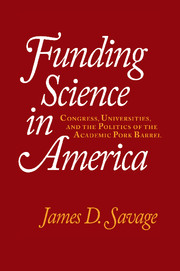Crossref Citations
This Book has been
cited by the following publications. This list is generated based on data provided by Crossref.
de Figueiredo, John M.P.
and
Silverman, Brian S.
2002.
Academic Earmarks and the Returns to Lobbying.
SSRN Electronic Journal,
Payne, A. Abigail
2003.
The Effects of Congressional Appropriation Committee Membership on the Distribution of Federal Research Funding to Universities.
Economic Inquiry,
Vol. 41,
Issue. 2,
p.
325.
de Figueiredo, John M.
and
Silverman, Brian S.
2004.
How Does the Government (Want to) Fund Science? Politics, Lobbying and Academic Earmarks.
SSRN Electronic Journal,
Geiger, Roger L.
2004.
Markets in Higer Education.
Vol. 6,
Issue. ,
p.
161.
LEE, FRANCES E.
2004.
Bicameralism and Geographic Politics: Allocating Funds in the House and Senate.
Legislative Studies Quarterly,
Vol. 29,
Issue. 2,
p.
185.
Slaughter, Sheila
and
Rhoades, Gary
2005.
From “Endless Frontier” to “Basic Science for Use”: Social Contracts between Science and Society.
Science, Technology, & Human Values,
Vol. 30,
Issue. 4,
p.
536.
Meyers, Roy T.
2006.
The Return of Budget Deficits in the United States.
Public Administration Review,
Vol. 66,
Issue. 2,
p.
294.
Djebali, Taoufik
2006.
Recherche et développement dans les universités américaines : quel rôle pour les pouvoirs publics ?.
Revue LISA / LISA e-journal,
p.
51.
Law, Marc T.
Miller, Gary J.
and
Tonon, Joseph M.
2007.
Earmarked: The Political Economy of Agricultural Research Appropriations.
SSRN Electronic Journal,
Law, Marc T.
Tonon, Joseph M.
and
Miller, Gary J.
2008.
Earmarked: The Political Economy of Agricultural Research Appropriations.
Review of Agricultural Economics,
Vol. 30,
Issue. 2,
p.
194.
Pusser, Brian
2008.
Higher Education.
Vol. 23,
Issue. ,
p.
105.
Savage, James D.
2009.
The Administrative Costs of Congressional Earmarking: The Case of the Office of Naval Research.
Public Administration Review,
Vol. 69,
Issue. 3,
p.
448.
2009.
Table of Contents.
ASHE Higher Education Report,
Vol. 34,
Issue. 5,
p.
1.
Feller, Irwin
2009.
Performance Measurement and the Governance of American Academic Science.
Minerva,
Vol. 47,
Issue. 3,
p.
323.
Carlino, Gerald A.
and
Hunt, Robert M.
2009.
What Explains the Quantity and Quality of Local Inventive Activity?.
SSRN Electronic Journal,
Kasdin, Stuart
2010.
Recipes for Pork and Other Delicious Offerings for the New Administration.
Public Administration Review,
Vol. 70,
Issue. 3,
p.
401.
Kim, Jungbu
2011.
Political Institutions and Public R&D Expenditures in Democratic Countries.
International Journal of Public Administration,
Vol. 34,
Issue. 13,
p.
843.
Wills, Jocelyn
2011.
Innovation in a Cold [War] Climate: Engineering Peace with the American Military–Industrial Complex.
Enterprise and Society,
Vol. 12,
Issue. 1,
p.
120.
Benner, Mats
2011.
Universities in Transition.
p.
11.
Wills, Jocelyn
2011.
Innovation in a Cold [War] Climate: Engineering Peace with the American Military–Industrial Complex.
Enterprise and Society,
Vol. 12,
Issue. 1,
p.
120.



